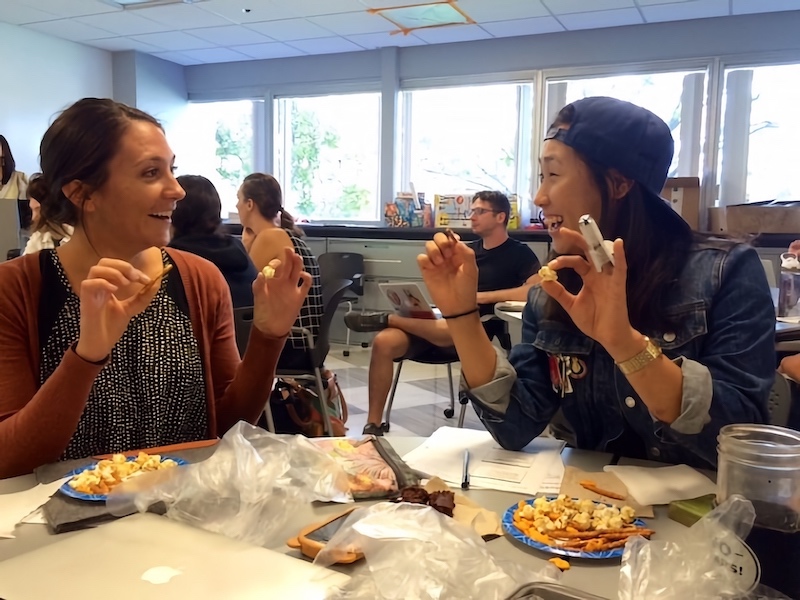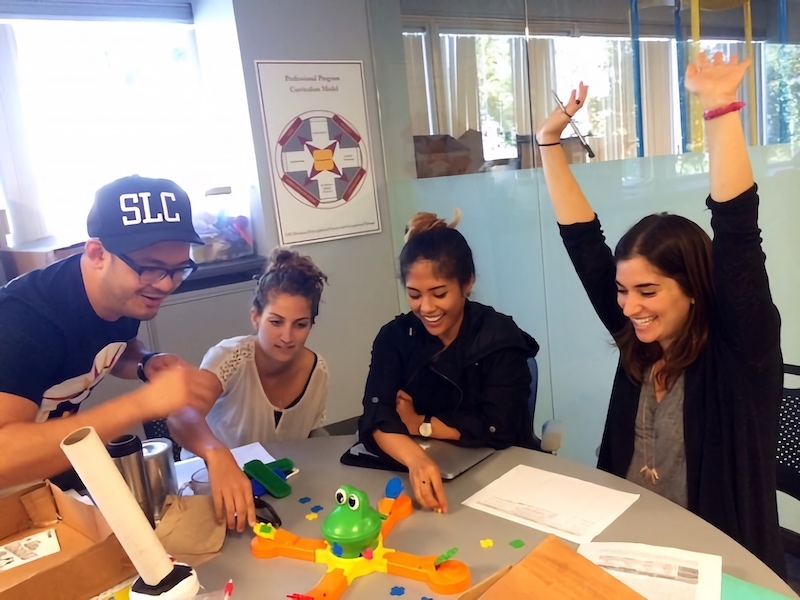FUN with Hand FUNction!

September 17, 2015
by Ariel
Hello all! We learned some really awesome stuff in class this week, so I thought it might be neat to give you guys a taste of the ways our professors make our lessons come to life!
To give you a little background, I am currently completing my Pediatric Immersion. This means that I have six hours of lecture per week in Peds, which is accompanied by three hours of lab. I know it sounds like a lot of hours for one subject, but our enthusiastic teachers keep things fresh and exciting by incorporating hands-on (and tasty!) activities into our lectures and labs.
This week, we learned all about hand function — grasp development, fine motor control, and the ways that children experiencing difficulties with the use of their hands might benefit from strengthening exercises, compensatory strategies, and/or adaptive equipment in order to thrive.
One of the coolest things about occupational therapy is that to an outside observer, the activities we do with our pediatric patients might look just like play. But in graduate school, we’ve learned how to break down these specific activities (such as games) into their smallest components — a process called activity analysis — in order to develop our clinical reasoning skills. Ultimately, this will help us in practice when the time comes to assess our patients’ abilities, plan meaningful interventions, and understand the fundamental demands (mental, physical, environmental, and otherwise) required for a person to successfully complete any given task.
Here are some fun pictures of my classmates learning all about functional hand grasps!

Cohort A Learns Pincer Grip!
For this activity, our professor brought in all kinds of yummy snacks, and then demonstrated each type of hand grasp we were learning by talking us through each position as we manipulated our food. Above are two classmates demonstrating the pincer grasp. So . . . Why is pincer grasp important? Well I’m so glad you asked! Pincer grasp employs the thumb and index finger to pick up small objects. It is a key developmental milestone that allows children the ability to feed themselves early on. Later, it is incredibly important in completing childhood tasks such as holding pencils, using utensils, and fastening things like buttons on a shirt.

Cohort A Plays Hand Games!
For this activity, our teacher brought in tons of child-friendly games. As a group, we analyzed each to determine their age appropriateness and created descriptions of accompanying skills the game develops (such as fine motor, visual motor, or cognitive). We then connected these skills with real-life activities in which a child might need to engage throughout his or her day (e.g., dressing, writing, feeding, bathing). In the above photo, you’ll notice my classmates are playing Mr. Mouth, a game that requires participants to employ skills such as pincer grasp, scanning, attention, impulse control, and force gradation. While this might sound like a lot of fancy-schmancy words, in reality, building these fundamental skills will later allow the child to fully engage in social play, develop their impulses, and get around in their community.
If you haven’t realized by now, the way an occupational therapist can use activity analysis to deduce the therapeutic benefits of specific activities is pretty incredible!
⋯
Next by tag Classes ⟩ What are OS/OT? ⟩
⋯





